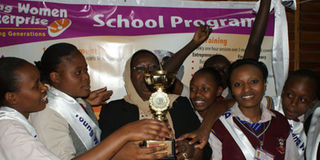‘Mama Nguo’ gets a run for her money

Maina Wanjigi Secondary School Achievers Club members celebrate with their principal Zuhura Rajab. The group presented a project that offers laundry services using an electro-solar washing machine. Photo/SULEIMAN MBATIAH
Should Mama Nguo not turn up to wash your clothes this weekend, five innovative students have a solution for you.
Under the name Achievers, the girls offer laundry services with the help of an electro-solar machine kept at home by one of the girls.
“Since the nation is becoming industrious and people are developing and achieving personal goals, they get worn out, and have less time to do their laundry,” 18-year-old Lulu Msabeni told the Nation on Thursday after winning a business plan competition.
Fire in the wind
Other group members are Ann Muthoni, Beryl Awino, Vigilance Saleka and Rose Kimani, all aspiring businesswomen. The business that started last month has seen the girls soar to great business heights. They have already employed two people.
And the returns have not only been encouraging, their services have spread like fire in a wind. Their customer base has grown and they are now considering buying another machine. “We started with Sh5,000 as capital and made a profit of Sh7,242 at the end of the month,” Lulu said.
The girls from Maina Wanjigi Secondary School in Eastleigh, Nairobi, beat 14 other schools in the Young Women in Enterprise awards held at the Kenya Institute of Education on Thursday. The future plan, Lulu says, is to start a central office beyond the home environment.
Achievers wants to become the leading laundry services provider and expand countrywide. With a mission to keep the country clean, smart and neat, the pentagon entertains no delays; their services are timely. “The business is affordable, accessible and convenient to our neighbours,” one of the girls said.
However, Lulu who is the chairperson, says the machine is noisy and sometimes there is scarcity of good detergents. “We do not want to damage clothes so that our customers can keep smiling,” Lulu said. The Achievers have beat the odds of the perennial water shortage in Nairobi and its outskirts and use water from a nearby bore hole.
They have cut costs on electricity fully using the solar option for the washing machine. Their advertising medium is word of mouth, posters and flyers. And the competition? According to Lulu, it’s Mama Nguo, the elderly estate women who go around knocking on doors and washing by hand.
Of the two staff members, one operates the machine and rinses the clothes while the other irons, collects and distributes. It’s amazing marketing at work. “We charge Sh50 for trousers, Sh20 each for a shirt or trouser and Sh10 for neckties. African attire and scouts uniform are charged at Sh100,” said the girls with regard to their pricing policy.
Detergent, fabric softeners, electricity and water bills are the expenses. The girls are head and shoulders above their peers who largely concentrate on schoolwork alone. On average, the group makes Sh400 per day and have Fridays and weekends as their peak business days.
Mr Cyprian Amakalu, a business advisor at TechnoServe, served as a judge at the competitions to award the group that came up with the most creative business ideas. “We were looking for a practical and sustainable idea, an enterprise that can easily be incorporated at the community level,” Mr Amakalu told the Nation.
The business plan winners got Sh15,000. The second and third got Sh10,000 and Sh3,000, respectively, besides long-term mentoring programme. According to Alice Waweru, an official at TechnoServe that trains girls in entrepreneurship, all this is done with the expectation that more girls own and develop business ideas into viable options.
Through Young Women Entrepreneurship clubs started in secondary schools, girls are divided into groups of four to five and are trained over a five-month period. They are equipped with such life skills as business plan writing and leadership.
Each girls then gets Sh1,000 to develop the business idea in their group. The programme is in 15 schools in Kawangware and Mathare and hopes to spread to other schools countrywide within a year.




